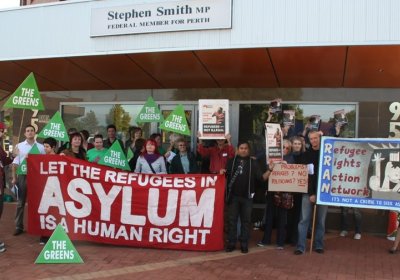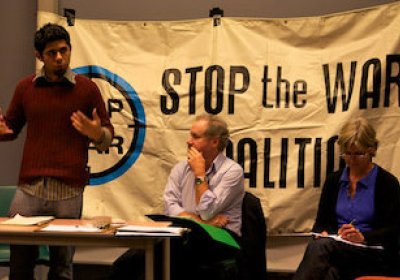The protest song is present still, yet to what extent does its significance reach the alienated world? The medium that transcends form and style seems smothered beneath the illusion of freedom of expression.
The murder of Chilean revolutionary singer Victor Jara may be a nauseating historical crime yet, today, protest singers are still exiled or assassinated in some countries. In the face of such brutal epilogues, the protest song may be mellowing its voice into a more socially acceptable role.
835
Beyond Black & White
By Manning Marable
Verso Press, 2009, 319 pages
Review by Malik Miah
Manning Marable’s latest book is an update of a valuable critique of Black and US politics first issued in 1995. He revised it last year, adding new chapters covering the period from 1995 to 2008, including an analysis of the meaning of the election of the first African American president of the US, Barack Obama, in November 2008.
In the United States, Google-owned video-sharing site YouTube has banned the video for hip hop star M.I.A.’s new single “Born Free”, citing the graphic nature of its content.
More than nine minutes long, the clip, directed by Romain Gavras, begins with heavily armed soldiers with US flags on their uniforms raiding someone’s home. The location is not known, but the setting is reminiscent of Baghdad or the Palestinian West Bank.
In the Cochabamba football stadium on April 22, diverse indigenous peoples paraded around the track, thousands of local peasants sat in the stands, and thousands more activists from around the globe waved flags and chanted on the field.
A common sentiment flowed through the crowd: something historic had occurred over the previous three days during the April 19-22 World People’s Conference on Climate Change and the Rights of Mother Earth organised by the Bolivian government in Cochabamba.
Palestinian Ambassador to Cuba Akram Samhan told an event in Havana on April 17 that Israeli jails have locked up more than 760,000 Palestinians since 1967. The event marked the 35th Palestinian Prisoner Day.
The staggering number of Palestinians jailed by Israel is equal to 20% of the population of Gaza, the West Bank and Eastern Jerusalem. Samhan said this demonstrates that the occupying force has been met with Palestinian resistance that will continue until their homeland is free.
Forty refugee rights supporters protested outside Labor foreign minister Stephen Smith's office on April 23, demanding an end to the government's "freeze" on asylum-seeker applications from Afghanistan and Sri Lanka.
Speakers included Refugee Rights Action Network members Phil Chilton and Victoria Martin-Iverson, Socialist Alliance candidate for Perth Alex Bainbridge and Greens Senator Scott Ludlam.
The next action planned by the Refugee Rights Action Network is an overnight vigil outside the Perth Immigration Detention Centre on May 7.
Clients at the Fairfield Migrant Resource Centre heard on April 29 that people in disadvantaged areas, such as Fairfield, could have their welfare benefits "quarantined" as early as next year.
The public meeting at the centre featured Peter Davidson from the Australian Council of Social Services and Richard Downs, spokesperson for the Alyawarr people’s walk-off in the Northern Territory.
The walk-off began in July 2009, protesting against the effects of welfare quarantining, and other NT intervention measures, in the community of Ampilatwatja.
Over April 19-20, Indonesian police and naval officers forced almost 150 Tamils onto buses at Port Merak and took them to the Tanjung Pinang detention centre. For seven months, more than 250 Tamils had withstood appalling conditions aboard a squalid boat at the West Java port.
Their hope was for refugee status in Australia. Their fear was of being locked up in Indonesian detention centres or deported back to Sri Lanka.
Israeli queer activists organised a protest on April 29 in front of the Israeli foreign affairs ministry in Jerusalem to protest against an “Israeli LGBT Festival” being organised in San Francisco called “Out in Israel”. The US event is funded by the Israeli consulate and Jewish organisations' together with support from the Israeli foreign affairs ministry.
As towns go, Orroroo in South Australia might seem small, but with 850 people it is one of the larger stops on the road between Broken Hill and Port Augusta. The countryside around it is marginal farmland.
Only in the occasional year is there enough rain for a good crop of wheat, and in a process with well-researched links to global warming, the wet years have been getting fewer.
It is ironic, therefore, that this district 250 kilometres north of Adelaide now seems destined to hurry climate change along.
Visiting Pakistani socialist and anti-war activist Ammar Ali Jan and Edmund Rice Centre director Phil Glendenning delivered powerful presentations on why the Afghanistan-Pakistan “war on terror” was a fraud. They spoke at a meeting organised by Stop the War Coalition on April 27.
Ali Jan said the US was facing a checkmate in Afghanistan after failing to find a credible replacement for the corrupt and increasingly weak President Hamid Karzai (also known as “the mayor of Kabul” for his limited political influence).
A military coup, backed by the United States, ousted a democratically elected government in Honduras on June 28, 2009. It has arrested, without trial, thousands of democracy activists.
More than 50 activists from the National Popular Resistance Front (FNRP) have been killed, and there are more than 100 other violent deaths related to the coup and curfews.
The lesbian, gay, bi-sexual, trangender and intersex (LGBTI) community is being particularly targeted.
- Page 1
- Next page




